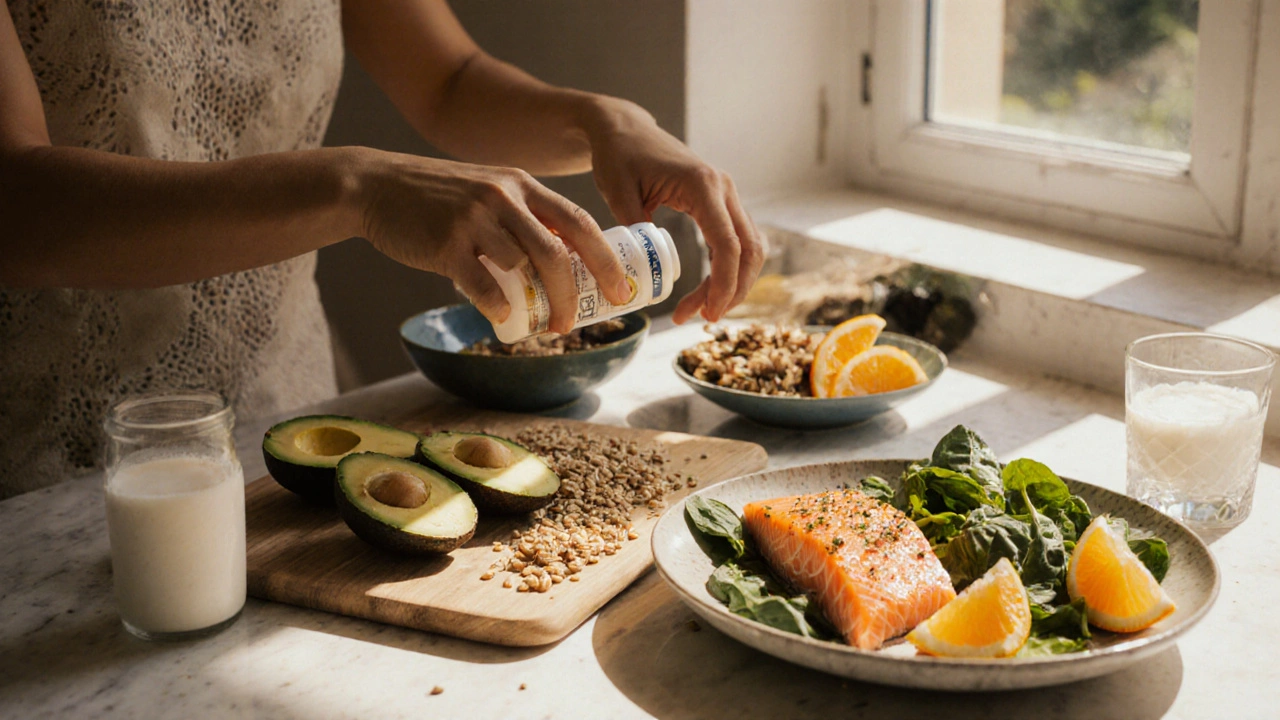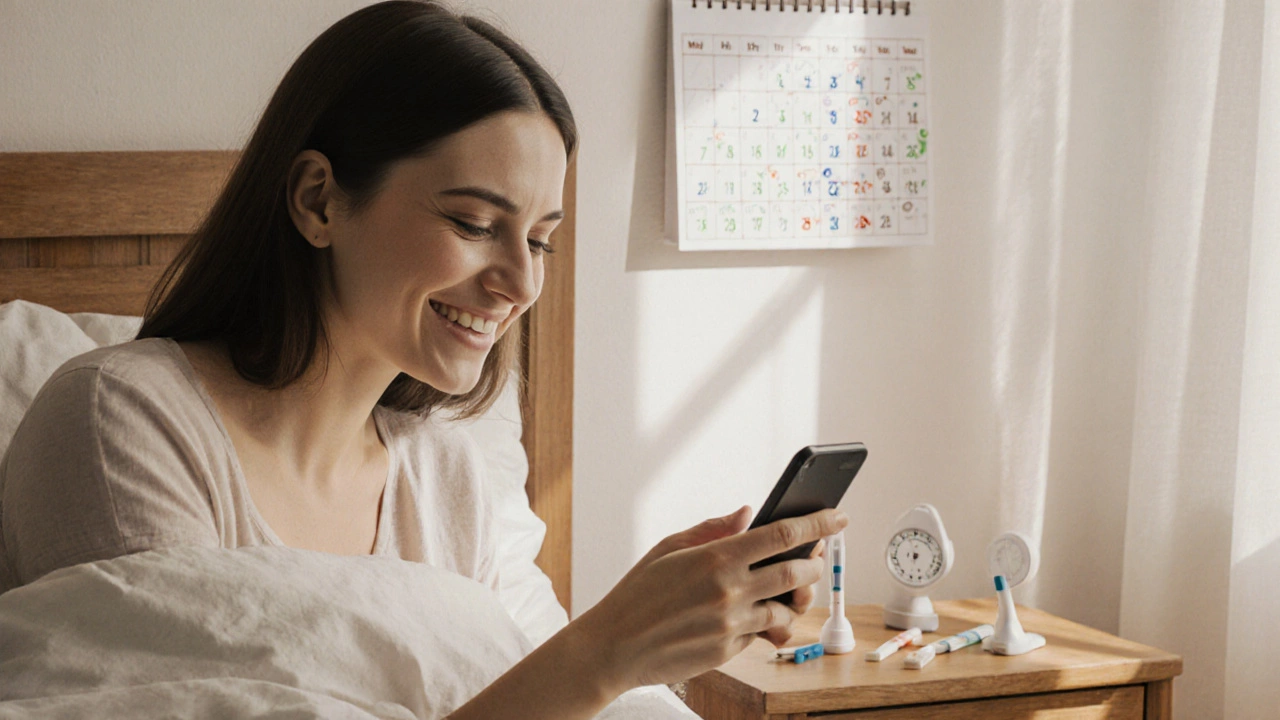Fertility Window Calculator
Calculate Your Fertile Window
Enter your cycle information to find your most fertile days. Based on the article's guidance about ovulation occurring 12-16 days before your next period.
If you’ve been trying to get pregnant for months without success, you’re not alone. About 1 in 6 couples in Australia face challenges conceiving. The good news? Many of the things that affect fertility are within your control. You don’t always need pills or procedures to improve your chances. Small, consistent changes to your daily habits can make a real difference.
Track Your Cycle to Find Your Fertile Window
Knowing when you’re most likely to conceive is the first step. Ovulation usually happens 12 to 16 days before your next period. But not everyone ovulates on day 14. Some women ovulate earlier, some later. Tracking your cycle helps you spot patterns.
Use a simple app like Clue or Flo to log your period start dates. Pair that with daily basal body temperature checks - your temperature rises slightly after ovulation. You can also use ovulation predictor kits (OPKs), which detect the surge in luteinizing hormone (LH) that triggers ovulation. These are available at any pharmacy in Sydney for under $20.
Have sex every other day during your fertile window - the five days before ovulation and the day of. Sperm can live up to five days in the body, so you don’t need to time it perfectly. Just be consistent.
Eat for Fertility, Not Just Weight Loss
What you eat affects your hormones, egg quality, and even cervical mucus. There’s no magic food, but certain patterns help.
Swap refined carbs like white bread and sugary snacks for whole grains, beans, lentils, and vegetables. Studies show women who eat more plant-based protein - like tofu, chickpeas, and nuts - have better fertility than those who rely on red meat.
Choose full-fat dairy over low-fat. A Harvard study found women who ate one or more servings of full-fat milk, yogurt, or cheese daily were 27% more likely to conceive than those who drank low-fat versions. Don’t panic if you’re not a dairy fan - you can get healthy fats from avocados, olive oil, and fatty fish like salmon.
Take a daily prenatal vitamin with at least 400 mcg of folic acid. It’s not just for after you get pregnant - it helps prevent neural tube defects from day one. Iron from spinach, lentils, or lean beef also supports ovulation. Pair iron-rich foods with vitamin C (like oranges or bell peppers) to boost absorption.
Manage Your Weight - But Don’t Starve Yourself
Being underweight or overweight can throw off your hormones and stop ovulation. A BMI between 19 and 25 is ideal for fertility. That doesn’t mean you need to lose 10 kilos overnight.
If you’re carrying extra weight, aim to lose 5-10% of your current body weight. Even a small drop can restart regular ovulation. If you’re underweight, focus on adding healthy calories - nuts, nut butters, eggs, and whole grains. Extreme dieting or excessive exercise can shut down your cycle. Your body needs energy to support pregnancy.
Exercise is good - but too much can hurt. If you’re running 50km a week or doing high-intensity workouts daily, cut back. Try walking, swimming, yoga, or light strength training instead. These keep your body balanced and reduce stress, which matters more than you think.

Reduce Stress and Sleep Better
Chronic stress raises cortisol, which can block ovulation and lower libido. You don’t need to quit your job or move to a beach hut - just find small ways to unwind.
Try 10 minutes of deep breathing before bed. Or take a warm bath with Epsom salts. Go for a walk in the park without your phone. Even 20 minutes of quiet time each day can lower stress hormones.
Sleep is just as important. People who sleep less than 6 hours a night have lower fertility rates. Aim for 7-8 hours. Keep your bedroom cool, dark, and screen-free. If you’re tossing and turning, try a white noise machine or a sleep meditation app.
Avoid Toxins That Hurt Fertility
Your environment plays a bigger role than most people realize. Cigarettes, alcohol, and recreational drugs all reduce fertility in both men and women. Quitting smoking can improve your chances of conceiving within months.
Limit alcohol to no more than one drink a week - or skip it entirely while trying. Even moderate drinking can lower egg quality and disrupt hormone balance.
Watch out for endocrine disruptors in everyday products. These are chemicals that mimic hormones. Avoid plastic food containers with BPA (look for glass or stainless steel). Skip synthetic fragrances in candles, air fresheners, and body washes. Choose natural skincare and cleaning products when you can.
Even your tap water might contain traces of hormones or pollutants. Consider a good carbon filter for your kitchen tap. It’s cheap and easy to install.

Check Your Partner’s Health Too
Fertility isn’t just a woman’s issue. About half of all infertility cases involve male factors. Sperm count, motility, and shape matter just as much as ovulation.
Men should avoid hot tubs, saunas, and tight underwear - heat kills sperm. Sitting for long hours? Take breaks. Ride a bike? Consider switching to a recumbent model - some handlebars put pressure on nerves that affect ejaculation.
Encourage your partner to eat the same fertility-friendly foods: zinc from oysters or pumpkin seeds, antioxidants from berries and dark leafy greens, and omega-3s from fish. He should also quit smoking, limit alcohol, and get 7+ hours of sleep.
If you’ve been trying for over a year (or six months if you’re over 35), it’s time for a basic fertility check. A simple semen analysis for him and a blood test for her can rule out hidden issues.
When to See a Specialist
Most couples conceive within a year of trying. If you’re under 35 and haven’t gotten pregnant after 12 months, or over 35 after 6 months, it’s time to talk to a doctor. Don’t wait longer. Time matters.
Early tests are simple: a blood test to check hormone levels (FSH, AMH, thyroid), an ultrasound to look at your ovaries, and a semen analysis for your partner. These aren’t expensive - many are covered by Medicare in Australia.
There’s no shame in needing help. Fertility treatments like ovulation induction or IUI aren’t failures - they’re tools. Many people who use them go on to have healthy babies. The sooner you start, the more options you’ll have.
What Doesn’t Work
There are a lot of myths out there. Lying on your back with your hips up after sex? Doesn’t help. Douching? Harmful - it kills good bacteria and can cause infections. Taking every supplement on the shelf? Waste of money - stick to the basics: folic acid, vitamin D, and iron if needed.
Don’t believe ads promising “instant fertility boosts.” No tea, herb, or crystal will override biology. Focus on science-backed changes instead.
And don’t compare your journey to others. Social media shows highlight reels - not the months of disappointment. Your path is yours alone.
How long does it take to boost fertility naturally?
It usually takes 2 to 3 months for your body to respond to lifestyle changes. Sperm takes about 74 days to mature, and eggs develop over several months. That’s why consistency matters. Don’t expect results overnight, but stick with it - most people see improvements within 90 days.
Can stress really stop me from getting pregnant?
Yes. High stress levels can delay or stop ovulation by affecting the hypothalamus, the part of your brain that controls reproductive hormones. It doesn’t mean you’re ‘too stressed’ - it means your body is protecting itself. Reducing stress doesn’t guarantee pregnancy, but it removes one barrier. Simple habits like walking, journaling, or talking to a friend can make a measurable difference.
Do I need to take supplements to get pregnant?
You don’t need dozens of supplements. Just one: a prenatal vitamin with at least 400 mcg of folic acid. Vitamin D is also important - many Australians are deficient, especially in winter. Ask your doctor for a blood test. If you’re low, they’ll recommend a dose. Other supplements like CoQ10 or myo-inositol may help in specific cases, but only take them under medical advice.
Can I get pregnant if I have PCOS?
Yes. Polycystic Ovary Syndrome (PCOS) makes it harder to ovulate, but it’s not a barrier to pregnancy. Many women with PCOS conceive with lifestyle changes alone. Losing even 5% of body weight can restore regular cycles. Eating low-glycemic foods, managing insulin resistance, and moving daily are the most effective steps. If needed, medications like metformin or clomiphene can help trigger ovulation.
Is it too late to improve fertility after 35?
Not at all. While fertility declines after 35, many women in their late 30s and early 40s have healthy pregnancies. The key is acting sooner rather than later. Get tested after 6 months of trying. Focus on diet, sleep, and reducing toxins. Don’t delay seeing a specialist - early intervention gives you more options, including IVF if needed.





